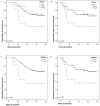PIK3CA exon 20 mutations are associated with poor prognosis in breast cancer patients
- PMID: 23184205
- PMCID: PMC3488987
- DOI: 10.6061/clinics/2012(11)11
PIK3CA exon 20 mutations are associated with poor prognosis in breast cancer patients
Abstract
Objectives: The phosphatidylinositol 3-kinase/AKT axis is an important cell-signaling pathway that mediates cell proliferation and survival, two biological processes that regulate malignant cell growth. The phosphatidylinositol 3-kinase CA gene encodes the p110α subunit of the phosphatidylinositol 3-kinase protein. There are phosphatidylinositol 3-kinase CA mutations in several types of human tumors, and they are frequently observed in breast cancer. However, these mutations have not been investigated in Brazilian breast cancer patients.
Methods: PCR-SSCP and direct DNA sequencing were performed to identify phosphatidylinositol 3-kinaseCA exon 9 and exon 20 mutations in 86 patients with sporadic breast cancer. The relationships between PIK3CA mutations and patient clinicopathological characteristics and survival were analyzed. The presence of the TP53 mutation was also examined.
Results: Twenty-three (27%) of the 86 primary breast tumors contained PIK3CA mutations. In exons 9 and 20, we identified the hotspot mutations E542K, E545K, and H1047R, and we identified two new missense mutations (I1022V and L1028S) and one nonsense (R992X) mutation. Phosphatidylinositol 3-kinase CA exon 20 mutations were associated with poor overall survival and TP53 gene mutations.
Conclusions: Phosphatidylinositol 3-kinase CA mutations are common in tumors in Brazilian breast cancer patients, and phosphatidylinositol 3-kinase CA and TP53 mutations are not mutually exclusive. Phosphatidylinositol 3-kinase CA exon 20 mutations are associated with poor survival, and they may be useful biomarkers for identifying breast cancer patients with aggressive tumors and for predicting the response to treatment with PI3K pathway inhibitors.
Conflict of interest statement
No potential conflict of interest was reported.
Figures


References
-
- Ciraolo E, Morello F, Hirsch E. Present and future of PI3K pathway inhibition in cancer: perspectives and limitations. Curr Med Chem. 2011;18(18):2674–85. - PubMed
-
- Murugan AK, Hong NT, Fukui Y, Munirajan AK, Tsuchida N. Oncogenic mutations of the PIK3CA gene in head and neck squamous cell carcinomas. Int J Oncol. 2008;32(1):101–11. - PubMed
-
- Samuels Y, Ericson K. Oncogenic PI3K and its role in cancer. Curr Opin Oncol. 2006;18(1):77–82. - PubMed
Publication types
MeSH terms
Substances
LinkOut - more resources
Full Text Sources
Other Literature Sources
Medical
Molecular Biology Databases
Research Materials
Miscellaneous

